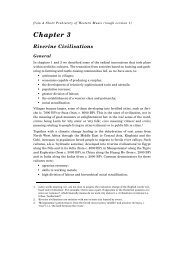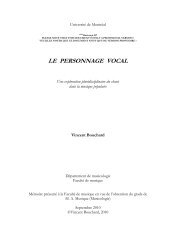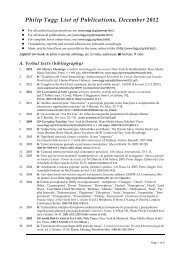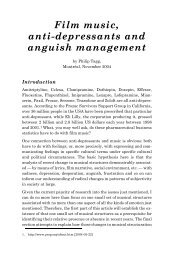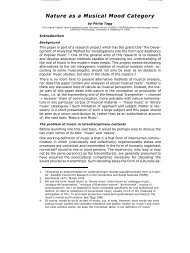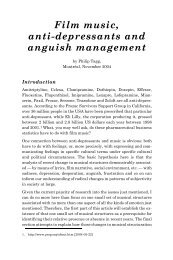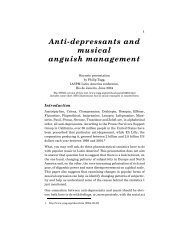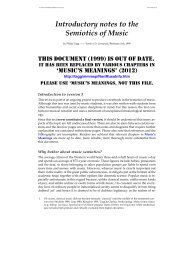From Refrain to Rave - Philip Tagg's home page
From Refrain to Rave - Philip Tagg's home page
From Refrain to Rave - Philip Tagg's home page
Create successful ePaper yourself
Turn your PDF publications into a flip-book with our unique Google optimized e-Paper software.
14<br />
melody nor melody plus accompaniment. Nor is it just accompaniment any<br />
more than West African polyrhythm, William Byrd's Great Service or<br />
Breughel's Slaughter of the Innocents. Polarising the issue, you could say<br />
that perhaps techno-rave puts an end <strong>to</strong> nearly four hundred years of the<br />
great European bourgeois individual in music, starting with Peri and Monteverdi<br />
and culminating with Parker, Hendrix and, Lord preserve us, Brian<br />
May, Whitney Hous<strong>to</strong>n and the TV spot for Bodyform sanitary <strong>to</strong>wels.37<br />
This is one important, musicologically founded reason for taking rave music<br />
seriously. Are we really witnessing a radically different musical expression<br />
of a radically new socialisation strategy amongst certain groups of young<br />
people in our society? If so, does this prefigure a new form of collective consciousness<br />
or does it mean the end of oppositionality and individualism? Or<br />
are ravers hedonistic defeatists who have abandoned all hope of being heard<br />
as individuals in this oppressive society or does their music encode a protest<br />
against a <strong>to</strong>tally compromised notion of individual freedom? Perhaps ravers<br />
have so conformed and identified with this system that their music expresses<br />
no distance <strong>to</strong> or quarrel with the inexorable pulse and au<strong>to</strong>mated march<br />
of society? Or does rave music say ‘up yours’ <strong>to</strong> ‘performance’, ‘achievement’,<br />
‘competition’, ‘enterprise’ and all those other nauseous thatcheritic<br />
buzzwords? Perhaps rave music at least criticises society by juxtaposing elements<br />
of music and sound that outside the musical event are traditionally<br />
supposed <strong>to</strong> belong <strong>to</strong> separate categories? Bearing in mind that real rave<br />
credibility consists of anonymously recording tracks on white labels, is it<br />
possible <strong>to</strong> suggest that the non-individualist character of the music actually<br />
does express a rejection of degenerate, hegemonic notions of the individual?<br />
Bearing also in mind the often semi-illegal, cooperative way in which raves<br />
are organised, is it going <strong>to</strong>o far <strong>to</strong> hypothesise that rave music prefigures<br />
new forms of collective consciousness? Or are rave organisers another variation<br />
on the old ‘hip capitalist’ theme and rave DJs a mere variation on the<br />
old theme of central figure against general background?<br />
The main aim of this paper has been <strong>to</strong> raise questions, not <strong>to</strong> answer them.<br />
In so doing, I have had <strong>to</strong> be quite polemical and <strong>to</strong> polarise issues quite<br />
radically. I have also had <strong>to</strong> simplify, skip major steps in lines of reasoning<br />
and leave gaping holes in both my own and in collective knowledge about<br />
techno-rave unfilled. This text may also give the impression that I consider<br />
all rave <strong>to</strong> be ‘collective and good’ and all rock <strong>to</strong> be ‘individualistic and bad’,<br />
a view <strong>to</strong> which I certainly do not subscribe. In polarising and simplifying issues,<br />
I have tried <strong>to</strong> formulate a few hypotheses (some more speculative<br />
than others) about how we, as scholars of popular music, could try <strong>to</strong> understand<br />
rave music's radical departure from the old rock canon. If we think<br />
37. The Bodyform sanitary <strong>to</strong>wel advert referred <strong>to</strong> is the one in which vast quantities of the<br />
commodity are spilled, acidentally on purpose, by one woman. One sanitary <strong>to</strong>wel is then<br />
picked up by the other woman and held up against the light coming through the Venetian<br />
blinds (they are so thin!). The vocal line is an ecsatatic, pompously anthemic and quite<br />
florid piece of gospel rock celebrating the commodity (‘whoa!.... Bodyformed for you!’).<br />
The music makes Nile Rogers's pastiche of the style — the ‘Soul Glow’ advert from Eddy<br />
Murphy's Coming <strong>to</strong> America — sound quite bland by comparison. It is difficult <strong>to</strong> imagine<br />
anything more fraught with the double standards of individuality and commerce than a<br />
sanitary <strong>to</strong>wel (menstruation is supposed <strong>to</strong> be a private issue and yet a majority of the<br />
population — women — experience the phenomenon for over a thousand days of their<br />
life). In fact it may be quite logical that the perverted ‘mega-individual’ of rock should be<br />
used <strong>to</strong> perpetuate such double standards.



